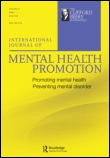
Intervention-International Journal of Mental Health Psychosocial Work and Counselling in Areas of Armed Conflict
Scope & Guideline
Fostering interdisciplinary approaches for healing.
Introduction
Aims and Scopes
- Mental Health in Conflict Settings:
The journal emphasizes research related to mental health challenges faced by individuals in conflict-affected regions, including trauma, PTSD, and psychosocial distress. - Psychosocial Interventions:
It covers various psychosocial interventions aimed at improving mental health outcomes in populations affected by violence and displacement. - Policy and Practice Implications:
The journal seeks to inform policy and practice in mental health services within humanitarian contexts, advocating for evidence-based approaches. - Cross-disciplinary Approaches:
It encourages interdisciplinary research that combines insights from psychology, social work, public health, and humanitarian studies to address complex mental health issues in conflict settings. - Capacity Building and Training:
The journal also highlights the importance of building local capacities for mental health and psychosocial support in conflict-affected areas, including training for practitioners.
Trending and Emerging
- Community-Based Approaches:
A growing trend towards community-based mental health interventions that engage local populations in the design and implementation of psychosocial support programs. - Trauma-Informed Care:
An increased focus on trauma-informed care that recognizes the impact of trauma on individuals and communities, emphasizing sensitivity and safety in service delivery. - Integration of Mental Health into Humanitarian Response:
Emerging themes include the integration of mental health services into broader humanitarian response frameworks, ensuring that mental health is prioritized alongside physical health. - Digital Mental Health Solutions:
There is a rising interest in digital mental health solutions, including teletherapy and mobile health applications, particularly in areas with limited access to traditional services. - Advocacy and Human Rights:
An emphasis on advocacy for the mental health rights of individuals in conflict settings, including the push for policy changes and accountability for mental health services.
Declining or Waning
- Traditional Mental Health Models:
There has been a noticeable decline in the focus on traditional mental health models that do not adequately address the complexities of trauma in conflict settings. - Individual-Centric Approaches:
Research focusing solely on individual mental health issues without considering the broader sociocultural and environmental factors is becoming less common. - Static Intervention Models:
There is a decreasing emphasis on static intervention models that do not adapt to the evolving needs of communities in conflict, as the field moves towards more dynamic and context-sensitive approaches. - Limited Focus on Prevention:
The journal's coverage of preventive mental health strategies in conflict zones has diminished, reflecting a shift towards response and recovery efforts. - Neglect of Longitudinal Studies:
There is a waning interest in longitudinal studies that track mental health outcomes over time in conflict-affected populations, as immediate needs often take precedence.
Similar Journals

Clinical Social Work and Health Intervention
Enhancing well-being through collaborative social work efforts.Clinical Social Work and Health Intervention is a prominent journal dedicated to advancing knowledge at the intersection of clinical social work and health interventions. Published by the International Scientific Group Applied Preventive Medicine (I-GAP EV), this journal serves as a critical resource for researchers, practitioners, and students alike, aiming to explore innovative practices that improve health outcomes through social work methodologies. With a focus on evidence-based research and interdisciplinary approaches, it caters to a growing field that recognizes the importance of social determinants in health. The journal is indexed with an ISSN of 2222-386X and E-ISSN of 2076-9741, ensuring a broad dissemination of its findings. By engaging with real-world challenges in healthcare and promoting collaborative solutions, Clinical Social Work and Health Intervention plays a vital role in bridging theories and practices, ultimately contributing to improved societal health and welfare.

Journal of Pediatric Hematology-Oncology Nursing
Fostering collaboration for better outcomes in pediatric nursing.The Journal of Pediatric Hematology-Oncology Nursing, published by SAGE Publications Inc, serves as a premier platform for advancing the field of pediatric nursing, particularly in the critical realms of hematology and oncology. With an ISSN of 2752-7530 and an E-ISSN of 2752-7549, this journal has quickly established its significance, achieving commendable rank status in various nursing specialties, including a Q1 placement in Advanced and Specialized Nursing as of 2023. It provides critical insights and evidence-based research across its converged years from 2022 to 2024, ensuring that professionals in the field remain at the forefront of best practices and innovations. The journal is especially relevant for nurses, medical professionals, and researchers aiming to improve patient outcomes in pediatric care. With open access options, it invites a broad readership to engage with its content, thus fostering collaboration and knowledge sharing in this vital area of healthcare.

Journal of Psychosocial Studies
Illuminating the Nexus of Culture and PsychologyThe Journal of Psychosocial Studies, published by Bristol University Press & Policy Press, is a vital resource for scholars and practitioners interested in the intersections of psychology, sociology, and cultural studies. With its ISSN 1478-6737 and E-ISSN 1478-6737, the journal aims to foster a deeper understanding of complex psychosocial phenomena within a global context, reaching a diverse audience from its base in the United Kingdom. As an open access journal, it ensures widespread availability of its research findings, while also maintaining rigorous academic standards through its Scopus rankings—in the 70th percentile for Cultural Studies and a respectable 15th percentile in Social Psychology. Covering converged years from 2019 to 2024, the journal provides a unique platform for innovative research and discourse, making it an essential reference for researchers, professionals, and students dedicated to advancing knowledge in social sciences.

Journal of Military Veteran and Family Health
Championing Research for Resilient Veteran FamiliesJournal of Military Veteran and Family Health, published by UNIV TORONTO PRESS INC, is an esteemed interdisciplinary journal dedicated to advancing the understanding of health issues related to military veterans and their families. With a focus on addressing the unique medical and psychosocial challenges faced by this population, the journal seeks to publish high-quality research, reviews, and policy papers that contribute to the global discourse in this vital area of health care. As of 2023, it holds a respectable Q3 ranking in the Medicine (miscellaneous) category, and boasts Scopus ranks placing it in the 57th percentile among general medicine journals. Available online with an E-ISSN of 2368-7924, the journal provides an accessible platform for researchers, healthcare professionals, and students to disseminate findings and foster collaboration, ultimately working towards improved health outcomes for veterans and their families. The journal has been actively publishing since 2018 and will continue its mission through to 2024, making it a pertinent resource for anyone invested in military health issues.

BJPsych Advances
Shaping the future of psychiatry with impactful research.BJPsych Advances is a distinguished journal dedicated to the field of Psychiatry and Mental Health, published by Cambridge University Press. With an ISSN of 2056-4678 and an E-ISSN of 2056-4686, this journal serves as a crucial platform for disseminating high-quality research and advancements in psychiatric science. Holding a position in the Q3 quartile as of 2023, it ranks 330 out of 567 in the Scopus database, representing a significant contribution to the mental health community, with a 41st percentile status. The journal not only covers recent innovations and methodologies but also emphasizes practical applications in clinical settings, making it an essential resource for researchers, practitioners, and students alike. With a commitment to fostering a deeper understanding of psychiatric disorders and their implications, BJPsych Advances plays a vital role in enhancing the standards of mental healthcare across the globe, bridging the gap between academic research and clinical practice.

Annals of General Psychiatry
Exploring New Horizons in Mental Health ScienceAnnals of General Psychiatry is a leading open-access journal published by BMC, dedicated to advancing the field of psychiatry and mental health. Since its inception in 2005, the journal has provided a robust platform for researchers to disseminate peer-reviewed clinical and experimental studies, case reports, and reviews that address the broad spectrum of psychiatric disorders. With an impressive Q1 ranking in Psychiatry and Mental Health for 2023, and a notable Scopus rank of #128 out of 567 in its category, the journal plays a pivotal role in disseminating high-quality, impactful research within the global scientific community. The open access model guarantees wide visibility and accessibility of research findings, ensuring that professionals, students, and policymakers can utilize the latest advancements in the psychiatric field. The journal's presence from 2002 to 2024 further demonstrates its commitment to contributing valuable insights that are relevant to contemporary challenges in mental health.

Journal of Dual Diagnosis
Bridging the gap between mental health and substance use research.The Journal of Dual Diagnosis, published by Routledge Journals, Taylor & Francis Ltd, is a leading interdisciplinary platform dedicated to the critical study of co-occurring mental health and substance use disorders. With its ISSN 1550-4263 and E-ISSN 1550-4271, this esteemed journal has been at the forefront of advancing research and clinical practice since its inception in 2004, and continues to serve as a vital resource until 2024. Ranked in the second quartile (Q2) in Psychiatry and Mental Health and positioned at the 64th percentile in the Scopus rankings, it emphasizes the importance of integrating care across various domains of health. Although not open access, it offers a wealth of peer-reviewed articles, case studies, and reviews suitable for researchers, practitioners, and students alike, aiming to enhance our understanding and treatment of dual diagnosis. The journal's commitment to addressing the complexities of dual disorders not only informs research but also shapes policy and clinical guidelines, making it an essential read for anyone involved in these critical areas of mental health.

ANNALES MEDICO-PSYCHOLOGIQUES
Exploring the Depths of Mind and MedicineANNALES MEDICO-PSYCHOLOGIQUES is a distinguished academic journal published by MASSON EDITEUR, focusing on the fields of applied psychology, psychiatry, and related arts and humanities. With its ISSN 0003-4487 and E-ISSN 1769-6631, this journal has been a pivotal platform for researchers since its inception in 1946, contributing valuable insights into the intersection of psychological theory and medical practice. Over the years, it has maintained a significant standing with a Q3 ranking in Applied Psychology and Q2 in Arts and Humanities (Miscellaneous), showcasing its commitment to high-quality research and scholarship. Although it does not operate under an open-access model, the journal remains accessible to researchers and practitioners alike, promoting the dissemination of critical knowledge in mental health and psychological sciences. As evidenced by its Scopus rankings, ANNALES MEDICO-PSYCHOLOGIQUES is recognized for its contributions within the academic community, making it an essential resource for professionals and students aiming to excel in these dynamic fields.

PSYCHIATRISCHE PRAXIS
Cultivating Understanding in the Field of PsychiatryPSYCHIATRISCHE PRAXIS, an esteemed journal published by GEORG THIEME VERLAG KG, serves as a vital resource in the field of psychiatry and mental health. Established in 1974, this German journal offers a compelling mix of original research, clinical insights, and theoretical discussions, contributing to the advancement of knowledge up to its historical convergence slated for 2024. With a distinguished Scopus ranking of #250 out of 567 in the Psychiatry and Mental Health category, and a 2023 Category Quartile of Q3, it stands as a significant platform for researchers and professionals. The journal does not currently offer Open Access options; however, its reputation and impact within the community place it as a valuable asset for those dedicated to understanding and improving mental health practices. PSYCHIATRISCHE PRAXIS engages its readership with innovative studies and authoritative viewpoints, making it an essential tool for scholars, practitioners, and students aiming to enrich their insight into psychiatric care and research.

International Journal of Mental Health Promotion
Innovating approaches to mental health and public health policy.The International Journal of Mental Health Promotion, published by TECH SCIENCE PRESS, serves as a vital platform for advancing research in the realms of mental health and public health policy. With a focus that spans across key categories such as Psychiatry and Mental Health, as well as Public Health and Environmental Health, this journal is recognized in the Q3 quartile for 2023, positioning itself to foster impactful dialogue among scholars, practitioners, and policymakers. Although the journal does not currently provide open access, it retains a significant role in disseminating essential findings that inform mental health promotion strategies globally. Researchers and students alike will find the journal's work invaluable in addressing contemporary challenges in mental health systems, contributing to evidence-based practice and policy formulation. With an emphasis on interdisciplinary collaboration and innovation, the International Journal of Mental Health Promotion is committed to enhancing the understanding of mental health trends and interventions from 2015 to 2024, ultimately enriching the scholarly landscape and improving mental health outcomes worldwide.